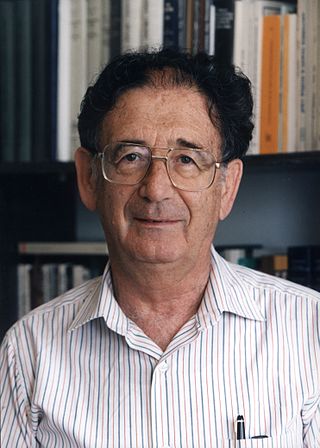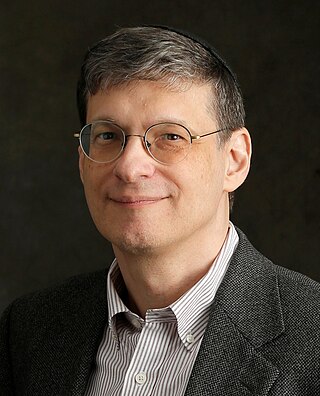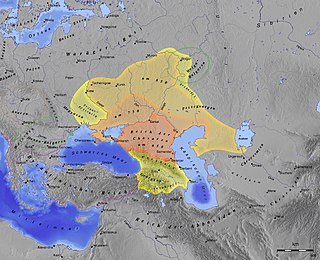Related Research Articles

Neturei Karta is an anti-Zionist and pro-Palestine Haredi Jewish group.

Ashkenazi Jews constitute a Jewish diaspora population that emerged in the Holy Roman Empire around the end of the first millennium CE. They traditionally speak Yiddish, a language that originated in the 9th century, and largely migrated towards northern and eastern Europe during the late Middle Ages due to persecution. Hebrew was primarily used as a literary and sacred language until its 20th-century revival as a common language in Israel.

Kamal Suleiman Salibi was a Lebanese historian, professor of history at the American University of Beirut (AUB) and the founding Director of the Royal Institute for Inter-Faith Studies in Amman, Jordan. He was a lifetime bachelor, who devoted his life to books.

Jewish Voice for Peace is an American Jewish anti-Zionist and left-wing advocacy organization. It is critical of Israel's occupation of the Palestinian territories, and supports the Boycott, Divestment and Sanctions (BDS) campaign against Israel.

Yehuda Bauer was a Czech-born Israeli historian and scholar of the Holocaust. He was a professor of Holocaust studies at the Avraham Harman Institute of Contemporary Jewry at the Hebrew University of Jerusalem.

Gilad Atzmon is an Israeli-born British saxophonist, novelist, political activist, and writer.
Antisemitism at universities has been reported and supported since the medieval period and, more recently, resisted and studied. Antisemitism has been manifested in various policies and practices, such as restricting the admission of Jewish students by a Jewish quota, or ostracism, intimidation, or violence against Jewish students, as well as in the hiring, retention and treatment of Jewish faculty and staff. In some instances, universities have been accused of condoning the development of antisemitic cultures on campus.

A bilateral relationship exists between Armenia and Israel. From 1993 to 2007, Armenia was served by the Embassy of Israel in Georgia. In 1996, Tsolak Momjian was appointed the honorary consul of Armenia in Jerusalem. Eleven years later, the residence of the Embassy of Israel in Armenia was moved to Jerusalem. In October 2010, Shmuel Meirom was appointed the Israeli ambassador to Armenia. Armen Melkonian was appointed the Armenian ambassador to Israel in 2012, with a residence in Cairo. In October of that year, Melkonian presented his credentials to Israeli president Shimon Peres. On 21 September 2019 Armenia announced that it would be opening an embassy in Israel. Despite generally cordial ties between the two, relations soured after Armenia withdrew its ambassador to Israel due to Israeli arms supply to Armenia's enemy, Azerbaijan, in the 2020 Nagorno-Karabakh War.
The Old Yishuv were the Jewish communities of the region of Palestine during the Ottoman period, up to the onset of Zionist aliyah waves, and the consolidation of the new Yishuv by the end of World War I. Unlike the new Yishuv, characterized by secular and Zionist ideologies promoting labor and self-sufficiency, the Old Yishuv primarily consisted of religious Jews who relied on external donations (halukka) for support.

Anti-Zionism is opposition to Zionism. Although anti-Zionism is a heterogeneous phenomenon, all its proponents agree that the creation of the modern State of Israel, and the movement to create a sovereign Jewish state in the region of Palestine—a region partly coinciding with the biblical Land of Israel—was flawed or unjust in some way.

Smadar Lavie is a professor emerita of anthropology at the University of California Davis, and a Mizrahi anthropologist, author, and activist. She specializes in the anthropology of Egypt, Israel and Palestine, emphasizing issues of race, gender and religion. She received her doctorate in anthropology from the University of California at Berkeley (1989).

Yoram Reuben Hazony is an Israeli-American philosopher, Bible scholar, and political theorist. He is president of the Herzl Institute in Jerusalem and serves as the chairman of the Edmund Burke Foundation. He has argued for national conservatism in his 2018 book The Virtue of Nationalism and 2022's Conservatism: A Rediscovery.

Events in the year 1944 in the British Mandate of Palestine.

Nahalat Shimon was a Jewish religious neighborhood of about 40 Jewish families in East Jerusalem in the area currently known as Sheikh Jarrah. It was founded in 1891 by Sephardic and Ashkenazi Jewish Kollels, to house poor Yemenite and Sephardi Jews. The cornerstone of the neighborhood was laid in 1890, near the Tomb of Simeon the Just.

The Louis D. Brandeis Center for Human Rights Under Law (LDB) is a 501(c)(3) nonprofit organization founded by Kenneth L. Marcus in 2012 with the stated purpose of advancing the civil and human rights of the Jewish people and promoting justice for all peoples. LDB is active on American campuses, where it says it combats antisemitism and anti-Zionism.

The Khazar hypothesis of Ashkenazi ancestry, often called the Khazar myth by its critics, is a largely abandoned historical hypothesis that postulated that Ashkenazi Jews were primarily, or to a large extent, descended from Khazars, a multi-ethnic conglomerate of mostly Turkic peoples who formed a semi-nomadic khanate in and around the northern and central Caucasus and the Pontic–Caspian steppe. The hypothesis also postulated that after collapse of the Khazar empire, the Khazars fled to Eastern Europe and made up a large part of the Jews there. The hypothesis draws on medieval sources such as the Khazar Correspondence, according to which at some point in the 8th–9th centuries, a small number of Khazars were said by Judah Halevi and Abraham ibn Daud to have converted to Rabbinic Judaism. The scope of the conversion within the Khazar Khanate remains uncertain, but the evidence used to tie the subsequent Ashkenazi communities to the Khazars is meager and subject to conflicting interpretations.

The Jerusalem Declaration on Antisemitism (JDA) is a document meant to outline the bounds of antisemitic speech and conduct, particularly with regard to Zionism, Israel and Palestine. Its creation was motivated by a desire to confront antisemitism and by objections to the IHRA Definition of Antisemitism, which critics have said stifles legitimate criticism of the Israeli government and curbs free speech. The drafting of the declaration was initiated in June 2020 under the auspices of the Van Leer Institute in Jerusalem by eight coordinators, most of whom were university professors. Upon its completion the declaration was signed by about 200 scholars in various fields and released in March 2021.
Anti-antisemitism is opposition to antisemitism or prejudice against Jews, and just like the history of antisemitism, the history of anti-antisemitism is long and multifaceted. According to historian Omer Bartov, political controversies around antisemitism involve "those who see the world through an antisemitic prism, for whom everything that has gone wrong with the world, or with their personal lives, is the fault of the Jews; and those who see the world through an anti-antisemitic prism, for whom every critical observation of Jews as individuals or as a community, or, most crucially, of the state of Israel, is inherently antisemitic". It is disputed whether or not anti-antisemitism is synonymous with philosemitism, but anti-antisemitism often includes the "imaginary and symbolic idealization of ‘the Jew’" which is similar to philosemitism.
Zionist antisemitism or antisemitic Zionism refers to a phenomenon in which antisemites express support for Zionism and the State of Israel. In some cases, this support may be promoted for explicitly antisemitic reasons. Historically, this type of antisemitism has been most notable among Christian Zionists, who may perpetrate religious antisemitism while being outspoken in their support for Jewish sovereignty in Israel due to their interpretation of Christian eschatology. Similarly, people who identify with the political far-right, particularly in Europe and the United States, may support the Zionist movement because they seek to expel Jews from their country and see Zionism as the least complicated method of achieving this goal and satisfying their racial antisemitism.

Yehoshua Yellin was a leader of the Old Yishuv movement and a developer of land in 19th-century Jerusalem.
References
- 1 2 ""Man will, dass die Leute verschwinden oder sterben"". fm4.ORF.at (in German). 4 October 2024. Retrieved 7 January 2025.
- ↑ Shehada, Muhammad (15 May 2023). "Scrutinising Israel's narrative about the Nakba". The New Arab. Retrieved 7 January 2025.
- ↑ Mackey, Robert (11 May 2021). "This Is Not Fine: Why Video of an Ultranationalist Frenzy in Jerusalem Is So Unsettling". The Intercept. Retrieved 7 January 2025.
- 1 2 Frazer, Jenni; Bachner, Michael; Fabian, Emanuel; Magid, Jacob; Steinberg, Jessica; Berman, Lazar; Sharon, Jeremy (20 August 2020). "Anatomy of a rumor: London U says Hebrew year abroad not nixed, despite reports". The Times of Israel. Retrieved 7 January 2025.
- 1 2 Wallach, Yair (2020-04-07). A City in Fragments. Stanford (Calif.): Stanford University Press. p. 258-9. ISBN 978-1-5036-1113-9.
- 1 2 3 4 "Dr Yair Wallach". SOAS. Retrieved 7 January 2025.
- 1 2 "Courses Faculty: Yair Wallach". Open Society University Network (OSUN). Retrieved 7 January 2025.
- 1 2 "Yair Wallach". Jadaliyya - جدلية. Retrieved 7 January 2025.
- ↑ "2022 Jordan Schnitzer Book Award Recipients". Association for Jewish Studies. Retrieved 7 January 2025.
- ↑ "A City in Fragments". Stanford University Press. 30 June 2020. Retrieved 7 January 2025.
- ↑ "Jerusalem's New Historians". Tel Aviv Review of Books -. 8 December 2020. Retrieved 7 January 2025.
- ↑ "Reading Jerusalem". Institute for Palestine Studies. 1 January 2020. Retrieved 7 January 2025.
- ↑ "The Ashkenazi Arab: Jewish European integration in the Middle East". UCL Institute of Jewish Studies. 26 August 2023. Retrieved 7 January 2025.
- ↑ Wallach, Yair (11 June 2023). "The racial logic of Palestine's partition". Ethnic and Racial Studies. 46 (8): 1576–1598. doi: 10.1080/01419870.2022.2151845 . ISSN 0141-9870.
- ↑ Wallach, Yair (2024). "The Unexplored History of Ashkenazi Integration in Late Ottoman Palestine". Jewish Social Studies. 29 (1): 161–192. doi:10.2979/jss.00006. ISSN 1527-2028.
- ↑ Phillips, Moshe (3 December 2023). "This professor is unfit to address an antisemitism conference". The Jerusalem Post. Retrieved 7 January 2025.
- ↑ "Yair Wallach". The Guardian. 8 October 2023. Retrieved 7 January 2025.
- ↑ "Yair Wallach". Haaretz. 9 December 2021. Retrieved 7 January 2025.
- ↑ "Yair Wallach". New Statesman. 1 January 1970. Retrieved 7 January 2025.
- ↑ "Yair Wallach". +972 Magazine. 30 November 1947. Retrieved 7 January 2025.
- ↑ "Yair Wallach". World Politics Review. 20 July 2024. Retrieved 7 January 2025.
- ↑ "Yair Wallach". Jewish News. 31 March 2021. Retrieved 7 January 2025.
- ↑ Podcasts, New Lines (4 October 2024). "End of an Era: Israel and the Arab World Before and After Hassan Nasrallah". New Lines Magazine. Retrieved 7 January 2025.
- ↑ "The Loneliness of the Israeli Left". Jewish Currents. 26 October 2023. Retrieved 7 January 2025.